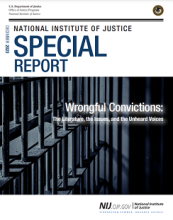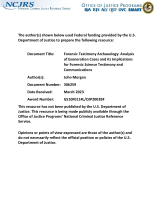Wrongful convictions
Criminal Investigative Failures: A Network Analysis
A postconviction mentality
Advancing Justice for the Missing and Unidentified Through Research - 2024 NIJ Research Conference
Forensic science research is developing essential knowledge to fill in the holes in death investigations, creating new ways to identify challenging skeletal remains. These methods inform cause of death, time of death, and familial relationships to guide investigations, identify suspects, support prosecutions, and bring justice to families.
See the YouTube Terms of Service and Google Privacy Policy
Incentivized Informants and Wrongful Convictions: Understanding the Risks and Mitigating the Effects
Schoolhouse interrogations and confessions: Perspectives from principals and students
The History of a Monumental Forensic Tool and the Ethical Debate Sparked by Wrongful Convictions Based on Trace DNA Evidence
Wrongful Convictions: The Literature, the Issues, and the Unheard Voices
The Impact of False or Misleading Forensic Evidence on Wrongful Convictions
The Postconviction Workgroup: Cooperation Between Adversaries in Exoneration Cases
Embodying Evidence to Action: Tracking the Impact of Three Key NIJ Research Investments
Just Wrong: The Aftermath of Wrongful Convictions
See the YouTube Terms of Service and Google Privacy Policy
The strength of our criminal justice system depends on its ability to convict the guilty and clear the innocent. But we know that innocent people are sometimes wrongfully convicted and the guilty remain free to victimize others. The consequences of a wrongful conviction are far-reaching for the wrongfully convicted and the survivors and victims of the original crimes.
The documentary Just Wrong: The Aftermath of...
Can Science Enhance Equity? Findings and Implications From a Study To Detect Bruising on Victims with Dark Skin Pigmentation
This plenary panel from the 2023 NIJ Research Conference features fascinating research on a methodology to improve the detection and documentation of bruises on victims of violence who have dark skin pigmentation. This study highlights the intersection between science, justice, and racial equity, featuring practitioner and victims’ advocacy perspectives. The discussion describes the research and its findings and explore strategies to ensure that this particular evidence-based methodology can be widely implemented by nurse practitioners in the field.
Participants:
See the YouTube Terms of Service and Google Privacy Policy
Wrongful convictions and claims of false or misleading forensic evidence
Forensic Testimony Archaeology: Analysis of Exoneration Cases and its Implications for Forensic Science Testimony and Communications
An Etiology of Wrongful Convictions: Error, Safety, and Forward-Looking Accountability in Criminal Justice
The Unrealized Promise of Forensic Science-A Study of Its Production and Use
Papers From the Harvard Executive Session on Policing and Public Safety (2008-2015)
The Hidden Costs of Reentry: Understanding the Barriers to Removing a Criminal Record
NIJ hosted a webinar to discuss under-researched aspects of reentry: expungement of criminal records and the impact of those records. This webinar includes a presentation of ongoing research projects examining the impact of legal aid for expungement and past research projects studying the accuracy and permanency of criminal records and the prevalence of collateral consequences of conviction. A Q&A session will conclude this webinar.
See the YouTube Terms of Service and Google Privacy Policy
Confirmation Bias and Other Systemic Causes of Wrongful Convictions: A Sentinel Events Perspective
Expanding Research to Examine the Impacts of Forensic Science on the Criminal Justice System
In 2004, the National Institute of Justice created the social science research on forensic sciences (SSRFS) research program to explore the impact of forensic sciences on the criminal justice system and the administration of justice. Much of the early research from the SSRFS program focused on DNA processing and the use of DNA in investigations and prosecutions.
See the YouTube Terms of Service and Google Privacy Policy




